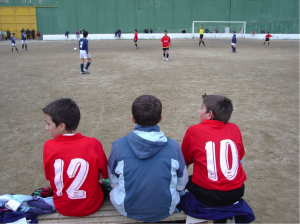The performance experienced by medicine in recent years could not be explained without the role of new technologies. Specifically, medical technologies have played an important role in understanding the mechanisms involved in the biological behaviour of the human body. Research, development and technological innovation become vital tools not only to improve the diagnosis and therapy of diseases, but also for improving the quality of life. Keep reading to learn B2SLab latest activities in physical activity research.
In recent years, the hypothesis is debated whether physical activity stimulates intellectual performance of students. This hypothesis considers that exercise changes the neuronal communication by acting on the space of exchanging information, which affects the brain connectivity by modifying the structure and function of the nervous system.
Researchers of the Biomedical Engineering Research Center CREB (Technical University of Catalonia UPC) want to bring our knowledge to the discussion of the previous hypothesis together with members of the Alliance for Biomedical Research and Technology (BERTA). This Alliance is formed by the Sant Joan de Déu Hospital, the CREB, the IBUB (Institute of Biomedicine, University of Barcelona) and the IR3C (Institute for Brain, Cognition and Behavior, University of Barcelona). The BERTA Alliance aims to develop projects where the child is the star. Within the field of health, the most important market is the adult, which focuses almost all innovations in the health sector. The pediatric sector requires customized solutions because they often cannot incorporate proposals conceived and designed for adults.
We have initiated a project to assess the influence of physical exercise on intellectual performance of children. Specifically, the objectives of this project are:
– To determine biomarkers of synaptic function, and to assess cognitive functions before, during and after physical activity, using electrophysiological testing.
– To assess the kinetics of neuronal growth factors produced by exercise.
– To analyse individual genetic variations that predispose to a greater cognitive benefit of exercise.
– To study brain changes by neuroimaging analysis.
The CREB provides to the project its knowledge on applied research, proposing new medical technology tools for the monitoring of physiological variables and the analysis of results. The Division of Bioengineering and Instrumentation will develop systems to monitor the body mass index, and the body composition, before and after the physical activity. The physical activity will be monitored using smartphones, to assess objectively the total daily activity levels in the children participating in the study.
The Computer Graphics Division of the CREB will design a computer game that will automatically measure the attention of the children before and after the exercise. Researchers of this division have experience working with children as end-users, and have developed software to work on mobile devices.
The Division of Biomedical Signals and Systems will participate in the integration and analysis of data using statistical methods, including: longitudinal analysis in consecutive measurements of biomarkers, training of nonlinear multivariate predictive models and integration of data from omics platforms.
The results of this study could be used for recommending specific programs of physical training in schools, aimed at improving cognitive skills and academic performance of students.

